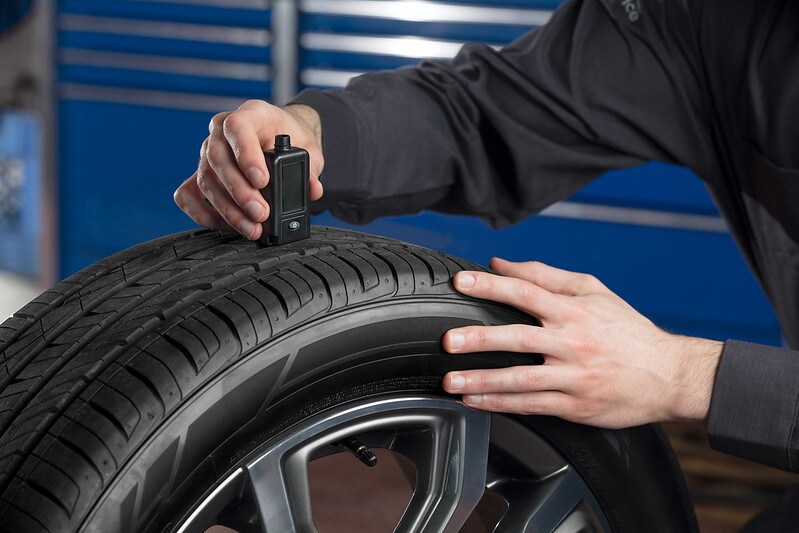

Every vehicle owner should know the basics about their car's various components. Your tires are especially important because they help keep you safe and secure in all kinds of road conditions - as long as they're in good shape! Here are some frequently asked questions we get here at Carr Chevrolet that we hope will help you maintain the quality of your vehicle's tires for years to come.
How often should you inflate tires?
Most vehicle and tire manufacturers recommend checking the tire pressure once a month. However, many new vehicles come with a tire pressure monitoring system (TPMS) that will automatically alert you when the air in your car's tires needs to be adjusted. Keep in mind, the tires could be under- or overinflated.
If your vehicle doesn't have a TPMS, you can purchase a tire gauge at most major retailers. There are digital options that show you a PSI (pounds per square inch) reading after putting the sensor over the valve for a set period of time. There are also manual versions that include a rod that shoots out (from the tire's air pressure) when you press on the valve, showing you a reading.
What PSI do tires need?
The appropriate amount of PSI for tires varies based on the tire brand, tire style, and your individual vehicle. Having the correct amount of air in the tires is vital because it ensures that they are working properly to keep you safe.
Most vehicles have the PSI listed for all of its tires on the driver's side door jamb. If you can't find the information there, check the owner's manual or come visit us at Carr Chevrolet and our team will take care of that for you.
What is tire tread and why is it important?
Tread is the pattern that you see on the tires, with all of its grooves and indents. These are made with the specific purpose of gripping the road and helping you maintain control when road conditions are wet or rough. As you drive your vehicle on family vacations or just to work, the tread wears down. If the tread gets too low, it could cause the tires to slip, especially in rain or snow.
Tire tread depth is usually measured in 32nds of an inch. Most tire manufacturers recommend keeping the tire tread depth at 6/32 or deeper. There are many ways to measure with coins, but your best bet is to have our team check the tires when you come in for routine maintenance.
What is a tire rotation?
While your car's tires technically rotate to move you forward, a tire rotation is not the same thing. We take the tires off the axles and rotate them to other spots on your car. An example of the typical method of switching them is moving the back left tire to the front right side and moving that front right tire to the back left side. The same goes for the other tires, too. Doing this helps the tire tread wear more evenly and ensures that the tires last longer.
How do you choose the right tires for your vehicle?
There are many different kinds of tires that you can choose for your vehicle. The most common type are all-season tires, which work for all kinds of road conditions and weather. Here in Oregon, if you frequently drive up to the mountains during the colder months, you may need to consider swapping your all-season tires out for winter tires. If you plan on going off-road a bunch during your weekend adventures, you could get all-terrain tires. We have a wide selection of tires available at Carr Chevrolet and we can help you make the best decision when you visit us.
If you have any additional questions about tire maintenance or anything else related to your vehicle, feel free to reach out to our team at Carr Chevrolet in Beaverton, Oregon. You can make an appointment with our Service Department online or by calling (866) 215-9665.
Contact Us
* Indicates a required field
Service Hours
- Monday 7:00 am - 6:00 pm
- Tuesday 7:00 am - 6:00 pm
- Wednesday 7:00 am - 6:00 pm
- Thursday 7:00 am - 6:00 pm
- Friday 7:00 am - 6:00 pm
- Saturday 8:00 am - 4:00 pm
- Sunday Closed